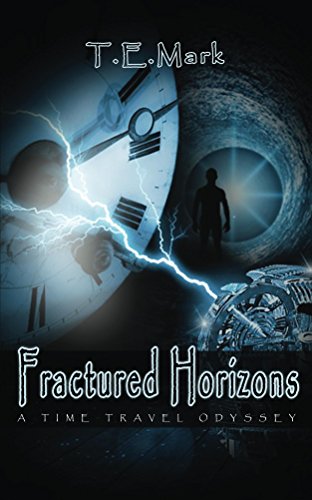Fractured Horizons | T.E. Mark
I first came across T.E. Mark’s writing on his blog (temarkauthor.wordpress.com) where he writes these cheerful suggestions for SF writers struggling with sounding sufficiently high-tech. He not only brings the real science to you in an easily digestible format, but then proceeds to take off on the wildest trips through space and time and the multiverse, peppering the reader with crazy tech and plausible technology terms, until you finish the piece either with a big grin on your face or laughing helplessly.

So I was more than delighted when he kindly agreed to give me a copy of Fractured Horizons for review. And I was certainly not let down in the least.
Fractured Horizons is a light read for young adults. The nearest book I can think of which is similar in theme is possibly Johnny and the Bomb by Terry Pratchett. As an older adult, I could wish FH was as long as JATB but TE Mark packs in quite a punch in a much shorter book.
Robert Davie, a teen in England, meets a new girl in school on page one. She’s mysterious, and knows more about him than he thinks possible, and leaves with a cryptic suggestion that he not freak out too much at the evening coming up; he’s not crazy. Robert, a studious type not given to thinking of himself as that attractive to girls, goes home. You know what they say about home? It’s where the wifi connects automatically. Robert finds out that the wifi not only doesn’t connect automatically, it doesn’t seem to be there. His mom is not his mom. The kitchen is not the kitchen. The world is not in 2016. He remembers Helena’s warning, and hangs onto sanity.
The next day is worse. He’s now in Alexandria, studying with Euclid, and he has a different name (and understands a different language)! Fortunately, Helena is around to explain/befuddle him more.
Robert finds he’s in ‘training’, but for what? He goes from past to future and back, depending on ‘what he learns’ during the day. Helena accompanies him throughout, nudging him towards understanding, managing the transitions and exchanging witty dialogue. The speed of the story and the light touch with the banter between the two made me spend the whole time reading FH with a smile on my face, sometimes expanding to a grin. The smile remained after the last scene flashed on the page and the final ellipsis came up.
The story is ostensibly about the adventures of Robert, but is actually more subtle. You end up wondering about which technological advances the present state of society can withstand, and which would likely overwhelm our coping power. Would you change it if you had the power? The book looks at nuclear power. A thoughtful teen would also go beyond and start wondering about climate change, about the Internet, and other technology impacts we take as ‘given’.
Do I recommend it? Well, if you want to smile your way through a neat story that allows you to think (or not, as you please), go right ahead and pick it up.
No comments:
Post a Comment